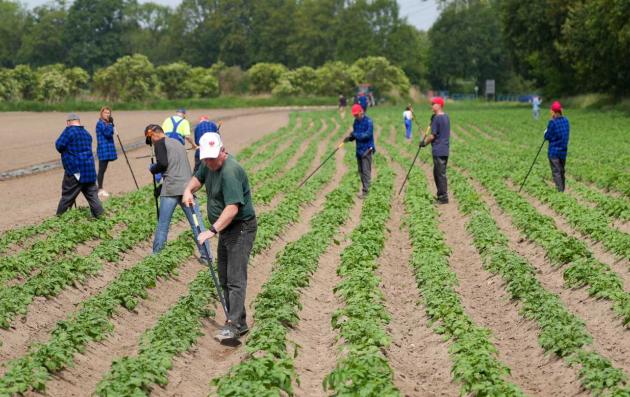Date of label : 29/10/2024
-
Wroclaw , Poland
-
Size of city : 893.506 inhabitants

A group of people working in a field
Summary
Wrocław's (PL) urban farm is an interdisciplinary project implemented through a collaborative partnership between the municipality, universities, an NGO and a business. It aims to deliver both social and environmental benefits. The goals of the urban arm are to:
- Increase the role of local production in the city's food system, and shorten supply chains.
- Promote sustainable agriculture.
- Reduce pollution, including CO2 from road transport, and prevent food waste.
- Support those most in need, including people in difficult life situations, those at risk of social exclusion, and lonely seniors.
The solutions offered by the Good Practice
The Urban Farm project involves the professional, large-scale cultivation of vegetables in Wrocław, providing fresh produce for meals in 16 public nurseries for the youngest residents of the city. The crops are transported from the farm by an electric car to reduce CO2 emissions. Managed by an NGO, the project also takes social needs into account, with the farm running a vocational programme for people at risk of social exclusion. To date, 20 people have participated in this programme, learning the necessary skills for farm and gardening work, giving them a chance to become financially independent.
Specialists from the Wrocław University of Environmental and Life Sciences oversee the cultivation methods, to ensure the highest quality of crops while limiting the negative impact of agriculture on the environment. During the project, observations were also made on which vegetable varieties and cultivation methods are best suited to the changing climatic conditions in the region. Additionally, the project obtained funds from private business for the implementation of educational activities.
The project aligns with the Milan Pact (of which Wrocław is a signatory), the Wrocław 2030 Strategy, the Urban Adaptation Plan to Climate Change, and the Mission of 100 Zero Emissions Cities.
Building on the sustainable and integrated urban approach
Urban Farm's operating model integrates multiple sectors to address environmental, economic and social challenges.
Environmental: Promotes sustainable agriculture, and reduces pollution (including CO2 from transport).
Economic: Helps people facing social and employment exclusion, by training them in food cultivation skills to facilitate their economic independent, while also helping recuce unemployment in the city.
Social: Supports lonely, dependent seniors, through the distribution of surplus crops and educational activities, including the creation of an educational zone for meetings, workshops, and as a place where various social groups can interact.
Based on participatory approach
The project was developed with a participatory approach at every stage, involving key sectors—local government, universities, a business and an NGO—whose inputs were made as complementary as possible. Contributors included:
6 municipal units: Climate and Energy, Health and Social Affairs, Wrocław’s Integration Centre, Wrocław’s Nursery Complex, Cooperation with Universities Office, and the Communication Division.
2 universities: Wrocław University of Environmental and Life Sciences, and SWPS University.
Business: InPost company.
NGO: “Mniej Więcej” Foundation.
What difference has it made?
The ongoing Urban Farm project brings benefits in terms of:
- Reducing pollution from transport.
- Shortening supply chains.
- Reducing the number of people at risk of exclusion.
- Reducing the risk of food waste.
- Increasing residents' awareness of sustainable food production, distribution and consumption.
Why this Good Practice should be transferred to other cities
The Urban Farm model is replicable in any other city and can be adapted to suit different urban contexts, in terms of cooperation between that city’s administration, scientific institutes, businesses and NGOs. Its interdisciplinary approach allows it to respond to many current challenges facing European cities.
The practice contributes to achieving:
- The Sustainable Development Goals (SDGs).
- The European Green Deal and its Farm to Fork Strategy.
- The Milan Pact.
- The New Leipzig Charter.
- The Urban Agenda for the EU, in the areas of circular economy, adaptation to climate change, jobs and skills in the local economy, sustainable use of land and solutions based on nature resources, urban mobility, and urban poverty.
The practice depends on local legislation regarding methods of delivering crops from local, urban cultivation for use as food in urban care and education facilities.
To transfer the practice to other cities, it is necessary to systematically exchange information and share experiences between cities. This reduces the risk of project failure and facilitates the adaptation of the project to local formal and legal realities.
